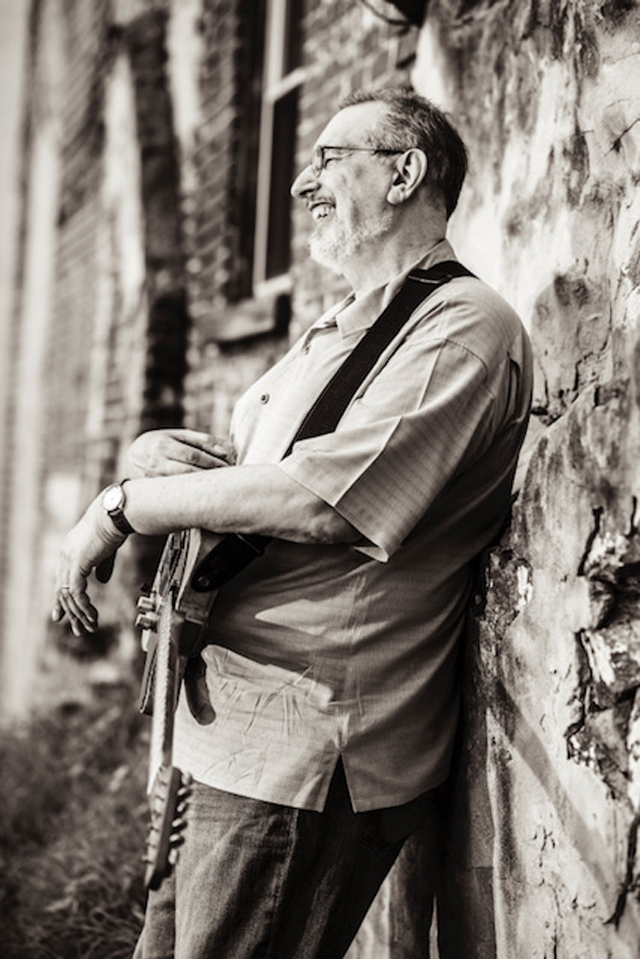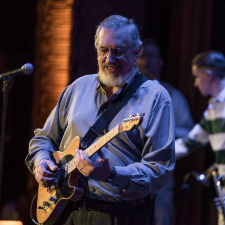

“We shall not cease from exploration, and the end of all our exploring will be to arrive where we started and know the place for the first time.” – T.S. Eliot
“There’s only two kinds of music – ‘the Star Spangled Banner’ and the blues.”
– Willie Nelson, quoting renowned fiddler Johnny Gimble
For Americana godfather David Bromberg, it all began with the blues.
His incredible journey spans five-and-a-half decades, and includes – but is not limited to – adventures with Bob Dylan, George Harrison, Jerry Garcia, and music and life lessons from seminal blues guitarist Reverend Gary Davis, who claimed the young Bromberg as a son. A musician’s musician, Bromberg’s mastery of several stringed instruments (guitar, fiddle, Dobro, mandolin), and multiple styles is legendary, leading Dr. John to declare him an American icon. In producing John Hartford’s hugely influential Aereo-Plain LP, Bromberg even co-invented a genre: Newgrass.
Add in a period of self-imposed exile from his passion (1980-2002), during which he became a renowned violin expert, and Wilmington, Delaware’s cultural ambassador; top that off with a triumphant return to music-making, and you have an amazing tale leading back to one place: the blues.
Now, with The Blues, the Whole Blues, and Nothing But the Blues, his first release for Red House Records, Bromberg and multi-Grammy-winning producer/accompanist Larry Campbell (Dylan, Levon Helm, Paul Simon) focus on the music David discovered in high school, when, circa late 50s, he was introduced to a friend’s dad’s collection of blues 78s. He’d only just taken up guitar as a means to pass the time while in bed with the measles.
“I loved those 78s so much,” says David, “I taped them on a portable reel-to-reel, so I could listen at home and learn.”
That love is evident in The Blues, the Whole Blues and Nothing But the Blues. The album is both blues primer and an opportunity to witness a master embracing this distinctly American music with passion and grace.
“There’s a lot of different types of blues on there,” Bromberg notes. “We decided to start it off with a dyed-in-the-wool blues [Robert Johnson’s “Walkin’ Blues”], but there’s also country blues [“Kentucky Blues”], and gospel-influenced blues [“Yield Not”].”
Bromberg, a onetime sideman himself, is quick to give props to his long-running road-and-studio cohorts: Butch Amiot (bass), Josh Kanusky (drums), Mark Cosgrove (guitar), Nate Grower (fiddle), and Peter Ecklund (cornet). Of producer, arranger, multi-instrumentalist, fellow Reverend Gary Davis acolyte, and old friend Larry Campbell, he says, “To use a baseball analogy, Larry is like a star at any position in the infield, because he can play them all.”
Since meeting in the early 80’s, Campbell and Bromberg had crossed paths many times. They finally worked together in Levon Helm’s studio for David’s 2013 return-to-form Only Slightly Mad. “He wanted to do a Chicago blues album then,” Larry says. “But we decided to remind folks of what he does better than anyone: the whole gamut of Americana, the full Brombergian. And we got some new fans. For this one, we went back to the blues, and made use of David’s great vocabulary in all veins of the genre.”
Bromberg’s guitar work remains a marvel; amped electric lead – both slide and fretted – and delicately powerful acoustic fingerpicking propel these songs with the same force that made him the go-to guy for acts ranging from the Eagles to Link Wray to Phoebe Snow. This is a man who can go full-on Chicago gutbucket with “You Don’t Have to Go” (a Bromberg original), then slay with the jazz inflections of Ray Charles’ “A Fool for You,” rendered here intimately solo. Although Bromberg points out he’s not the same guitarist he was before his two decades away from performing and recording. “I play differently,” he says. “I can’t play as fast, but playing slower gives me more time to think about what I’m doing.”
“He’s always able to plug into the emotion of a song,” Campbell says. “He’s incredibly inventive as a player. Sometimes restrictions can be good.”
Listeners can actually hear what the years have given Bromberg in the spartan, acoustic “Delia.” Bromberg originally covered this traditional nugget on his 1972 self-titled debut – a live, solo rendition with a spoken-word break. The new version features Campbell and Bromberg in the studio, revisiting Bromberg’s live arrangement from their occasional duo tours. It is mesmerizing, with gravitas only experience can bring. “Larry and I have played ‘Delia’ a lot,” Bromberg says. “I love what he does on it.”
Longtime fans will notice another difference: Bromberg’s voice; he’s really singing. The vocals cover a broad range: impassioned, vibrato-laden testifying; pew-jumping soul shouts; soft, confident, crooning; and, of course, his peerless raconteur chops (particularly in “You Been A Good Old Wagon”).
“When I first started,” Bromberg says, “singing was something I did between guitar solos. But during the period I did so little performing, I took some voice lessons, and now, I know more what I’m doing. I love singing now. Love it.”
Larry Campbell was impressed at the newfound vocal chops, too. “He is a better vocalist than ever,” he says. “He’s strong, and present. None of the songs took more than three takes. And he was able to take the old folk song ‘900 Miles’ [a “railroad song” made famous by Odetta and Woody Guthrie], and turn it into an electric blues that’s a real high point of the album for me.”
Although he remains the proprietor of the beloved David Bromberg Fine Violins in Wilmington, Delaware – “I love my shop,” he says – Bromberg makes time to tour with his quintet, and he’s already included every song in his live repertoire (save “Yield Not,” which requires a choir), from The Blues, the Whole Blues and Nothing But the Blues. As ever, he brings his characteristic devotional intensity to the music, invigorating his surprise third act with the same passion he felt as a teen, spinning those blues 78s, just before the road called.
BLOOMINGTON, IL — Chicago Farmer, the moniker Bloomington, Illinois’ Cody Diekhoff performs and writes under, is set to independently release his 7th album titled Midwest Side Stories on September 30, 2016. Midwest Side Stories is about hope, depression, job loss, meth, skateboards, a divided nation, used cars, the late shift, farms, factories, the destruction of our environment, and still being around to sing about it. The new release contains ten tracks all of which were written by Diekhoff (pronounced dee-cough), with the exception of the John Hartford classic “I’m Still Here.”
Folk hero Todd Snider says, “I love Chicago Farmer’s singing and playing and songs, but it’s the intention behind the whole of his work that moves me to consider him the genuine heir to Arlo Guthrie or Ramblin’ Jack Elliott. He knows the shell game that goes on under folk music… which is sacred to me. Chicago Farmer is my brother; if you like me, you’ll love him.”
Lyrically driven, Chicago Farmer delves into the social and political issues of today’s world, taking it all in and putting it back out through music as a commentary on modern times in the Midwest. With his unfeigned and relatable approach, Chicago Farmer has earned a place in the heart of this generation’s rise of protest songs. He composes music written and sung by and for the working man, the “regular person”, bringing to mind modern day folk tales.
“I arrived here, kicking and screaming the day that I took the stage, I went searching for some kind of meaning, like words looking for a page. Came up empty and full of worry that nothing could cover the pain, then these songs and stories began unfolding like an umbrella in the rain.” This is the opening stanza to the first song “Umbrella”, a song that speaks of the power of music in people’s lives and is dedicated to songwriters everywhere, including many of whom we’ve lost in 2016.
With heartfelt observations of the world around him, Chicago Farmer has been around the folk scene for a while now singing the stories he has written along the way, aiming to capture the essence of the human condition and putting it all on display. He has gotten to know a variety of players over the years and brought together a wonderful cast of musicians to perform on the album. Diekhoff co-produced Midwest Side Stories, with engineer Chris Harden at I.V. Labs Studios in Chicago, Illinois. Harden also played Glockenspiel and harmonized vocals on select tracks. Others on the album include vocalist and guitarist Ernie Hendrickson, drummer Darren Garvey, vocalist Heather Horton, and a handful of other Midwestern mainstays.
Cody has his finger on the pulse of middle America. Coming from a long line of family farmers and factory workers in central Illinois and growing up in a rural farming community has inspired many songs that are autobiographical in nature. Farms & Factories” is a workgrass song featuring fiddle, tempo changes, and the farming side of Chicago Farmer. In 2002 he moved up north to the big city where he came up with the name Chicago Farmer for what was initially intended to be a band, but ended up keeping the name for himself and started writing and recording albums. Eventually he moved back in 2008 to central Illinois where he makes his home in Bloomington. The Midwest is where he was born and raised. It’s where he first started to write poetry and where he would eventually set those words into motion with his guitar.
With Midwest Side Stories Chicago Farmer builds an adventurous narrative that brings issues to the front burner with folk/protest songs. “Two Sides of the Story” is an acoustically portrayed glimpse of the evolving division in the United States. It takes aim at the media, politics, and religion’s role in that division. “There’s two sides to every story, there’s two sides to every town, the side of town that tells the story. The side where the story went down.”
An upbeat electric working class protest song, “Revolving Door,” describes manufacturing job loss in the Midwest with howling vocals, a driving beat, and ripping harmonica. “My home state of Illinois continues to have the highest unemployment rate in the region, and manufacturing jobs continue to disappear.” Cody says, ”Politicians who work the current system to benefit themselves and their constituencies have sold out these industries and workers. While the CEO’s of these companies hand out pink slips to their workforce, they continue to hand themselves bonuses.”
“9pm to 5” examines the plight of the working American and pays tribute to those with unconventional work hours. At other times Chicago Farmer goes tongue-in-cheek with “Skateboard Song” which takes listeners on a ride with this folk story song, questioning our laws and priorities.
Midwest Side Stories is a follow up to 2013’s Backenforth, IL which rose to #33 on the Americana Charts as well as top #10 on several folk charts. Honest Tune wrote of it, “You can smell the dirt in the fields, hear the wind as it blows across the plains, and see the people that Chicago Farmer sings about. Each track captures a moment in time, whether for a person or a particular place. Imagine if a John Steinbeck short story had been written as a song, and this will give you a fairly good idea as to what Chicago Farmer accomplishes on his albums.”
Chicago Farmer is ready to kick down some more doors and put something new in as many ears, hands, living rooms, and car stereos as possible. Midwest Side Stories is available now on pre-order on Kickstarter and folks that donate will receive it at their doorstep several weeks before the official release. “We’ve set our goal at $20… because we love you.” Cody says, “My last album has a song called The Twenty Dollar Bill. It’s easily one of my top 3 requested songs, I especially love that it’s requested by people of all ages. It’s a story song inspired my grandparents and I’ve been told has moved a lot of people. We put a lot of heart, soul, sweat, tears, and even some blood into making this album. While the basics are covered, we still have a large hill to climb and any support that you can offer is greatly appreciated”
Midwest Side Stories captures everything that Chicago Farmer is capable of as a performer, songwriter and story teller. He draws you in with the emotion in his voice and holds you captive with the lyrical pictures he paints about the real struggle the common man is up against.


